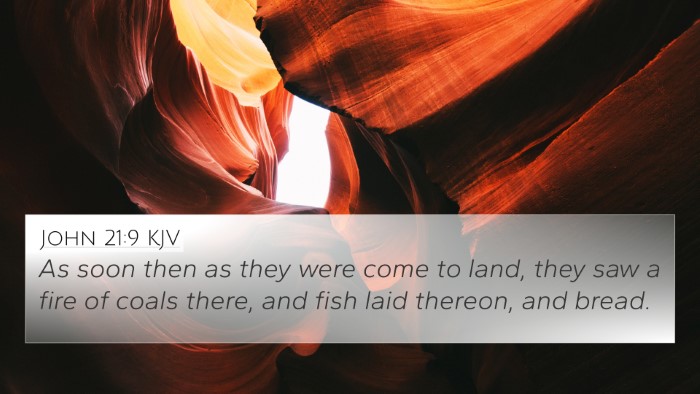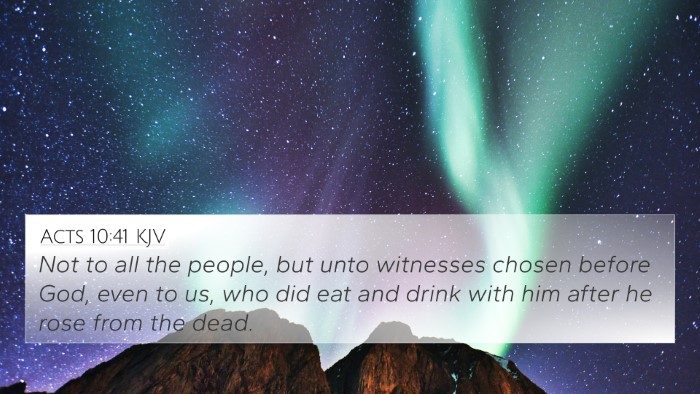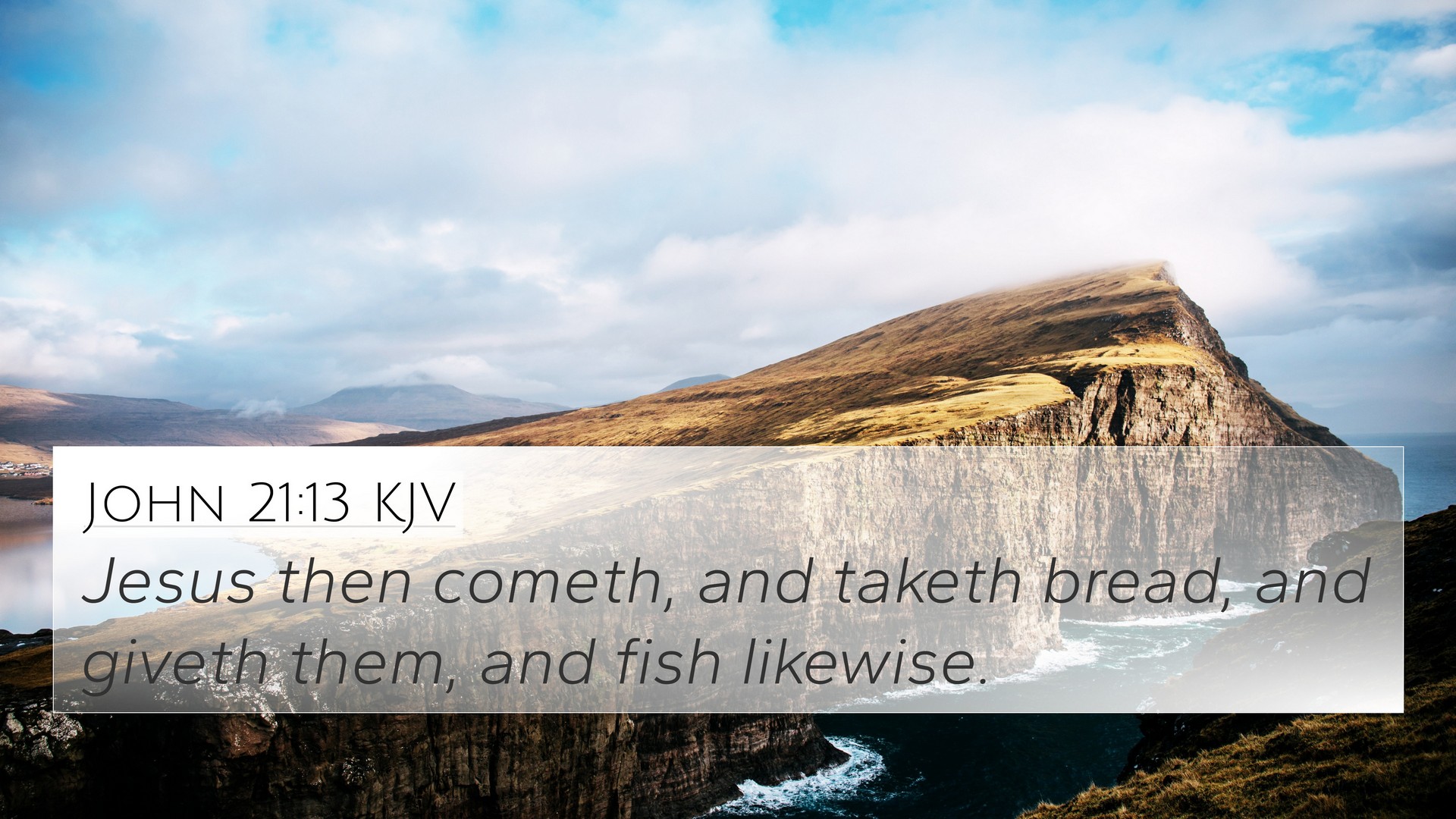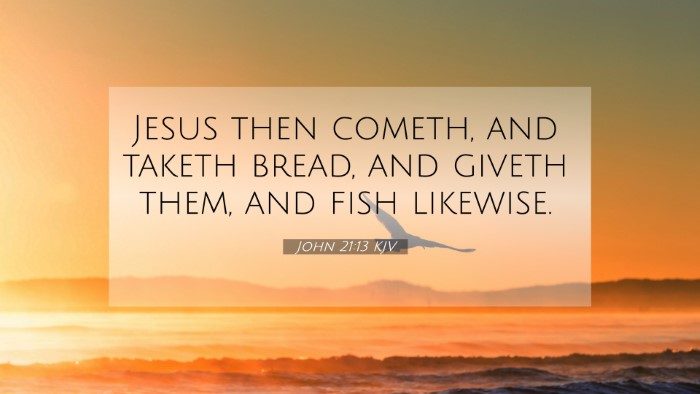Old Testament
Genesis Exodus Leviticus Numbers Deuteronomy Joshua Judges Ruth 1 Samuel 2 Samuel 1 Kings 2 Kings 1 Chronicles 2 Chronicles Ezra Nehemiah Esther Job Psalms Proverbs Ecclesiastes Song of Solomon Isaiah Jeremiah Lamentations Ezekiel Daniel Hosea Joel Amos Obadiah Jonah Micah Nahum Habakkuk Zephaniah Haggai Zechariah MalachiJohn 21:13 Similar Verses
John 21:13 Cross References
Jesus then cometh, and taketh bread, and giveth them, and fish likewise.
Uncover the Rich Themes and Topics of This Bible Verse
Listed below are the Bible themes associated with John 21:13. We invite you to explore each theme to gain deeper insights into the Scriptures.
John 21:13 Cross Reference Verses
This section features a detailed cross-reference designed to enrich your understanding of the Scriptures. Below, you will find carefully selected verses that echo the themes and teachings related to John 21:13 KJV. Click on any image to explore detailed analyses of related Bible verses and uncover deeper theological insights.

John 21:9 (KJV) »
As soon then as they were come to land, they saw a fire of coals there, and fish laid thereon, and bread.

Acts 10:41 (KJV) »
Not to all the people, but unto witnesses chosen before God, even to us, who did eat and drink with him after he rose from the dead.
John 21:13 Verse Analysis and Similar Verses
Understanding John 21:13
John 21:13 states: "Jesus then came and took bread, and gave it to them, and fish likewise."
This verse acts as a pivotal moment in the post-resurrection appearances of Jesus, illustrating connections between the Last Supper and Jesus' ongoing ministry with His disciples. In this summary, insights from various public domain commentaries will shed light on the deeper meanings encapsulated within this verse.
Overall Meaning
In this scene on the shore of the Sea of Tiberias, Jesus appears to His disciples after His resurrection. He performs a simple yet profound act of sharing food, which serves to reinforce His relationship with His followers. This moment illustrates several theological truths, as well as practical implications for believers.
Key Insights from Commentaries
-
Matthew Henry:
Henry highlights the significance of Jesus breaking bread, drawing parallels to the Last Supper and emphasizing the communal aspect of the disciples' relationship with Jesus. This act serves as a reminder that Jesus remains the sustainer of life for His followers.
-
Albert Barnes:
Barnes notes that Jesus' action of giving bread and fish symbolizes His continued provision for His people. The simplicity of the meal illustrates that spiritual nourishment often comes through ordinary experiences in fellowship with Christ.
-
Adam Clarke:
Clarke underscores that this moment reinforces the disciples’ commission. By eating with them, Jesus re-establishes His authority and reminds them of their mission to spread the gospel. This act also serves as a form of reassurance of His resurrection.
Connecting Themes in Scripture
John 21:13 not only stands alone but also connects to several key biblical themes. Below are cross-references that relate to this verse and reflect the themes of communion, provision, and resurrection:
- Luke 24:30-31: This passage narrates the moment when Jesus breaks bread with the disciples on the road to Emmaus, highlighting recognition and communion.
- Matthew 14:19: Here, Jesus feeds 5,000 people, showing His ability to provide sustenance and to bless food, which is a precursor to the communal meal in John 21.
- John 6:35: Jesus declares Himself as the "bread of life," reinforcing the symbolic nature of bread in His teachings and relationship with humanity.
- Acts 2:42: The early church devoted themselves to the apostles' teaching, fellowship, and breaking of bread; an echo of the communal aspects initiated by Jesus.
- 1 Corinthians 11:24: Paul recounts the Lord’s Supper, drawing a direct connection to the breaking of bread and the sacrificial nature of Christ’s ministry.
- John 21:10: In this preceding verse, Jesus instructs the disciples to bring some of the fish they caught, showing His desire for their contributions in the ministry.
- Revelation 3:20: Jesus speaks of dining with believers, indicative of fellowship, relationship, and the invitation to communion with Him.
Thematic Bible Verse Connections
Thematically, John 21:13 can be linked to various scriptural concepts through inter-Biblical dialogue. Key themes include:
- The Provision of God: God's continual provision is echoed throughout Scriptures, as seen in Psalms 23:1, "The Lord is my shepherd; I shall not want."
- The Fellowship of Believers: The act of breaking bread resonates with Acts 2:46, where the early Christians shared meals together, reinforcing community.
- The Resurrected Presence of Christ: Romans 6:9 reminds believers that Christ, being raised from the dead, will never die again, paralleling the assurance present in John 21:13.
- Jesus as the Living Bread: Aligning with John 6:51, where Jesus identifies Himself as the living bread that came down from heaven, reinforcing the life-giving nature of His presence with His disciples.
Practical Applications
Believers today can draw several practical lessons from John 21:13:
- Communion with Christ: Regularly engaging in spiritual practices such as prayer and Scripture reading can foster a deeper connection with Jesus, akin to sharing a meal with Him.
- Shared Community: Just as the disciples came together, Christians are encouraged to engage in community life, supporting one another in faith and practice.
- Trusting God for Provision: In times of need, believers are reminded to trust God, who provides for their needs, mirroring the way Jesus provided for His disciples.
Conclusion
John 21:13 encapsulates the essence of Jesus’ relationship with His followers and serves as a reminder of His ongoing presence after resurrection. The act of breaking bread signifies not only sustenance but also fellowship, assurance, and the commissioning of believers. By exploring cross-references and drawing connections between various scriptures, one can appreciate the rich tapestry of themes that underscore the significance of this verse in the life of a follower of Christ.



